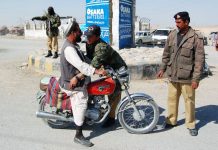Karachi: None of the four government hospitals have a place to keep dead bodies in the cosmopolitan city of 20 million people where tragedies’ resulting in a large number of deaths is almost a matter of routine.
The job of storing bodies until families claim them falls in the hands of renowned welfare organization that maintains the largest functioning morgue in Karachi.
“Though legally, bodies which are nominated as the subject of police cases are to be kept at the designated government’s medico-legal centers. In the absence of such facility, the Edhi morgue which has a capacity of between 250 and 300 bodies is authorized by the police to keep the bodies of people who die sudden deaths either due to violence or due to accidents,” said acting Police Surgeon Jalil Qadir.
Dr. Seemin Jamali, in-charge of the hospital’s causality section, told News Lens Pakistan that other than the three largest government hospitals even the busiest medico-legal centre, Jinnah Postgraduate Medical Centre, did not even have a mortuary of its own. She said, “Even the space where autopsies and post-mortems were conducted belongs to the Sindh Medical University.” “But, we have set up a mini mortuary of our own in the emergency section and can keep a body or two,” she added.
Initially, a cold storage facility was built at the Abbasi Shaheed Hospital in 2009 but it was shut down because of a faulty transformer, said Karachi Metropolitan Corporation’s (KMC) Senior Director for Health Services, Salma Kausar. She said since the medico-legal section was under the domain of the provincial Health Department, the same authority should be responsible for the maintenance of cold storage facility. On the other hand, the medico-legal officers working there held that as the hospital’s administration was in the hands of KMC, it should install the transformer to make the morgue functional.
Similarly, a cold storage facility was built at the Civil Hospital Karachi several years ago but was closed after a couple of incidents in which the heirs of a deceased attacked the medico-legal section, said an anonymous medico-legal officer. According to her, the infrastructure for keeping bodies in cold storage was available at the hospital and it was just a matter of making it functional and maintaining it.
In the first week of January, 64 people were burnt when a passenger bus caught fire after colliding with a fuel container. The autopsies were conducted at the Jinnah hospital where bodies took up all the room in the open-air cemented mortuary. “Even the floor was covered with bodies,” said Dr. Jamali.
Other welfare organizations also run morgues, but none of them has been authorized by the police to keep the bodies prior to investigations. An anonymous MQM Coordination Committee member told News Lens Pakistan that the Khidmat-e-Khalq Foundation, a welfare wing of Muttahida Qaumi Movement (MQM), operated three morgues in Malir, Orangi and North Karachi areas each with a capacity of between 20 and 25 bodies. Three more morgues were being built in Landhi, Ranchore Lines and Janahgir Road by the said foundation.
Ali Ahmer of Majlis-e-Wahdat-e-Muslimeen told that Imambargahs such as Fatimia Community Centre, Shah-e-Karbala Imambargah in North Nazimabad and JaffarTayyar Imambargah in Malir also maintain a place to store.
Security concerns
Police Surgeon Dr. Qadir told News Lens Pakistan that the medico-legal officers, who questioned the hidden reasons of the deaths in sensitive cases, were often targeted and threatened. Qadir added that though some of the mortuaries were short of proper instruments, the medico-legal officers did not want to risk their lives by keeping the bodies at the facility. “The Health Department does not give us enough funds to buy the furniture, let alone security,” said Qadir.
On the contrary, angry relatives of deceased ones often stormed the mortuaries and wreaked havoc on them. “Such situation makes functioning morgues a risky business. It is safer for us without running them,” he said.
A medico-legal officer at the Jinnah hospital Dr. Manzoor Memon, was shot dead near his home last year. During an interview before his death, he had confessed about being followed and threatened by henchmen of a political party because he had conducted the post-mortem of one of the political activists.
In February, another medico-legal officer of Jinnah hospital, Dr. Shahzad Butt, held a press conference to reveal that he had been picked up from his home and forced to delete the records of the autopsy he had conducted on the body of a criminal who had died in a police encounter.



